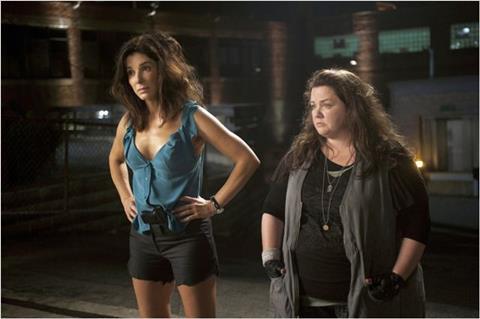Dir: Paul Feig. US. 2013. 117mins

A gleefully R-rated comedy packing intermittent belly-laughs but not a lot of truly inspired comedic moments, The Heat twists the conventional macho buddy-cop movie by making its main characters bickering women — a clever idea that doesn’t quite translate into dynamite execution. Teaming Sandra Bullock, Melissa McCarthy and McCarthy’s Bridesmaids director Paul Feig, this Fox offering is a blitzkrieg of verbal sparring that more often than not feels strained when it aspires to be hilarious.
Mirroring a strategy he utilised in Bridesmaids, Feig in The Heat is making the point that women (who are often missing from raunchy comedies) can be just as ribald and shocking as their male counterparts.
Opening June 28 in the US, The Heat boasts plenty of star power, aided by the fact that it’s one of the few summer studio releases featuring female protagonists. With another R-rated comedy, This Is The End, still in the marketplace, perhaps there’s some concern about direct competition, but the betting is that The Heat’s easily marketable plotline will lure audiences, especially after McCarthy’s last film, Identity Thief, snagged almost $135m domestically. (Although it only brought in about $40m internationally.)
With a script by TV writer Katie Dippold (Parks And Recreation), The Heat stars Bullock as Sarah Ashburn, a straight-laced New York FBI agent who travels to Boston to investigate a lead about a drug dealer. Once there, she meets Shannon Mullins (McCarthy), an uncouth, hard-ass police officer who doesn’t take kindly to Ashburn’s condescending tone. Forced to work together, they begin to suspect that there’s a mole inside the Boston police department working for the mysterious crime boss they’re trying to bust.
Much like 2010’s The Other Guys, The Heat gets much of its comic mileage from spoofing the clichés of the buddy-cop genre. This comes through most clearly in the two characters’ construction: Bullock’s Ashburn is meant to be the traditional rule-follower, while McCarthy’s Mullins is the de rigueur wild-eyed loose cannon. The recognisable character types complement each actress’s onscreen persona, and the leads enthusiastically engage in the lengthy rat-a-tat-tat dialogue face-offs that result from their characters’ oil-and-water relationship.
Unfortunately, beyond the gender shift, The Heat’s principal characters aren’t particularly funny creations. Those familiar with McCarthy’s work in Bridesmaids and Identity Thief will notice in Mullins much of the same comedic tics: She’s a ballsy, shameless, foul-mouthed brute whose outlandishness conceals more vulnerable emotions underneath. Likewise, Bullock’s workaholic Ashburn is meant to be an unpopular, uptight stiff, but it’s not a well-drawn character, leaving the actress to bring a little charm to the monotone role, with middling results.
The two women have palpable chemistry in the film’s later stretches after their characters have become friends, but before then The Heat spends a lot of time having them endlessly yell at each other, as if amplifying the volume was equal to increasing the laughs.
As can sometimes be a problem when aping a well-known genre, The Heat proves less fun when Ashburn and Mullins are put through the motions of the cop-thriller plot mechanics. While almost no one will be attending The Heat because of the ins and outs of its story, the filmmakers get bogged down investing time in the women’s investigative work, which ultimately leads to them (and Mullins’ over-the-top stereotypical Irish family) being put in mortal danger. To be sure, the jokes continue to fly in every direction even then, but the plot busyness fails to spark any inventive comedic set pieces.
Mirroring a strategy he utilised in Bridesmaids, Feig in The Heat is making the point that women (who are often missing from raunchy comedies) can be just as ribald and shocking as their male counterparts. He’s more overt in his commentary with his new film, which draws attention to the difficulties facing female law enforcement officers in a male-centric culture. With that in mind, The Heat ought to be subversive or liberating, but it tends to be too hectic and scattershot to achieve anything so satisfying.
McCarthy’s boundless, aggressive energy can be a fun contrast to Bullock’s demure slow-burn, but this is a comedy in which you can see both actresses huff and puff while going for jokes. Since the characters and their situation aren’t that imaginatively thought out, the humour has to come from their constant clashing, a good source for laughs but hardly an inexhaustible one.
With the two actresses front and centre, the supporting cast tends to disappear into the background, with Demian Bichir, Marlon Wayans and Jane Curtin given little to do. But special mention goes to Dan Bakkedahl, who steals his few scenes as the predictably obstructing DEA agent who keeps blocking Ashburn and Mullins’ progress. It’s a one-joke character — he’s an albino, and a creepy one — but it turns out to be a joke with a lot of give to it.
Production company: Chernin Entertainment
US distribution: Twentieth Century Fox, www.foxmovies.com
Producers: Peter Chernin, Jenno Topping
Executive producers: Paul Feig, Michele Imperato Stabile, Dylan Clark
Screenplay: Katie Dippold
Cinematography: Robert Yeoman
Production designer: Jefferson Sage
Editors: Brent White, Jay Deuby
Music: Mike Andrews
Website: www.theheatmovie.com
Main cast: Sandra Bullock, Melissa McCarthy, Demian Bichir, Marlon Wayans, Michael Rapaport, Jane Curtin, Spoken Reasons, Dan Bakkedahl, Taran Killam, Michael McDonald, Tom Wilson






![The Brightest SunScreen[Courtesy HKIFF]](https://d1nslcd7m2225b.cloudfront.net/Pictures/274x183/3/5/0/1448350_thebrightestsunscreencourtesyhkiff_312678.jpg)














